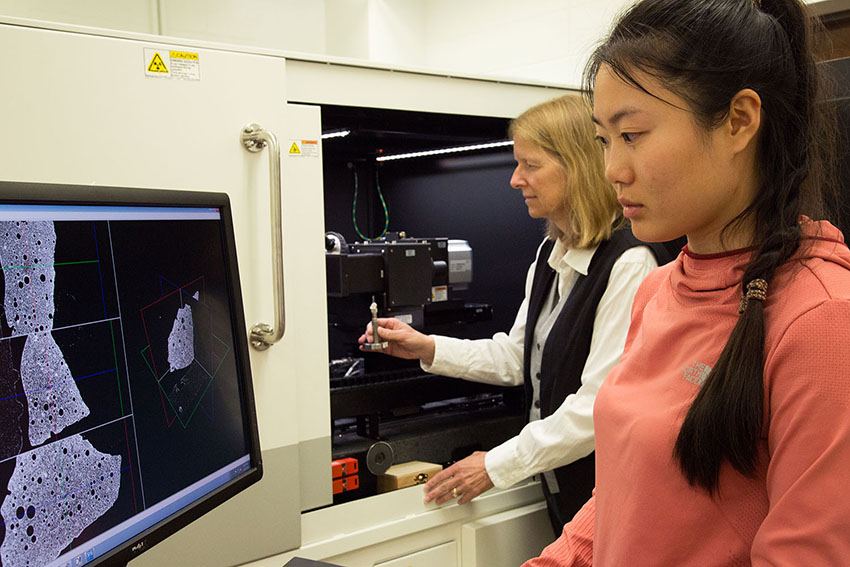What can I do with a major in Physics & Astronomy?
Careers in Physics & Astronomy

Physics professor Laura Pyrak-Nolte and graduate student Liyang Jiang use a 3D X-ray microscope to examine and analyze created mineral samples. Pyrak-Nolte and her lab team work to better understand how and where fractures form.
Business
Cost Estimators collect and analyze data to estimate the time, money, resources and labor required for product manufacturing, construction projects or services. Some specialize in a particular industry or product type.
Financial Analysts provide guidance to businesses and individuals making investment decisions. They assess the performance of stocks, bonds and other types of investments.
Product Specialists are experts about a specific product, strategically plan production, marketing and sales, and interact with many organizational departments and customers.
Quantitative Financial Market Analysts work in finance using numerical or quantitative techniques.
Education
Physics Teachers are responsible for educating students on the laws of matter and energy.
Science Writers describe discoveries and commercial developments in all branches of science, engineering, medicine and environmental science. They explain the impact these discoveries have on the lives of average individuals.
Environment
Air Quality Specialists’ work includes a variety of tasks having to do with air quality monitoring, air pollution inspections, regulation, law enforcement, and planning.
Atmospheric Scientists, including meteorologists study weather, climate and other aspects of the atmosphere. They develop reports and forecasts from their analysis of weather and climate data.
Climate Change Analysts (climatologists) evaluate scientific data and research about the climate. The climate data often includes, but is not limited to, information about atmospheric temperature, ocean conditions, ice masses and greenhouse gases.
Geoscientists perform laboratory and field tests to monitor the environment and investigate sources of pollution, including those that affect health.
Hydrologists examine the physical characteristics, distribution & circulation of water above & below the earth’s surface. They study rainfall & other precipitation, the paths precipitation takes through the soil & rocks underground, & its return to the oceans and air.
Remote Sensing Scientists use sensors to analyze data and solve regional, national, and global problems in areas such as natural resource management, urban planning and climate and weather prediction.
Sanitarians perform laboratory and field tests to monitor the environment and investigate sources of pollution, including those that affect health.
Water Quality Specialists study how water quality affects human health, while considering the long-term “health” of pipes in the distribution system.
Health
Health-related
Medical Physicists apply physics research to the medical arts for the design of equipment and techniques used to safely study the human body and diagnose and treat diseases.
Law and Government
Patent Agents work with inventors, researchers and attorneys to evaluate an invention disclosure, assess patentability, and draft a fillable patent application. Patent law offers opportunities for those who wish to leave the lab but not science.
Patent Lawyers review advances in technology and explain and argue differences in technology to judges, juries, and patent office examiners.
Science Policymakers serve as the bridge between researchers and the public, using their talents to find ways to translate esoteric, often highly technical scientific issues into something that can be sold as good policy.
Research and Development
Aerospace engineers design, develop, and test aircraft, spacecraft, and missiles, as well as supervise the manufacture of these products.
Astronauts train to pilot a spacecraft, travel in a spacecraft or work in space.
Astronomers conduct research to understand the nature of the universe and everything in it.
Bioinformatics Scientists (computational biologists) work at the intersection of biology, computer science and information technology (IT), helping identify the genetic causes of human, animal and plant development and disease.
Computational Physicists’ jobs involve calculations and formulas. They combine physics, computer science and applied mathematics in order to provide scientific solutions to realistic and often complex problems.
Consumer Product Development Specialists use chemistry, physics and engineering to study and develop products that range from food and personal care items to medicine.
Materials Scientists are concerned with the relationship between the structure and properties of materials.
Nanotechnologists can work in any scientific area, including agriculture, medicine, engineering, and technology. They enjoy learning new things, working with cutting-edge science, and developing solutions to society’s problems.
Operations Research Analysts use advanced methods of analysis to help organizations solve problems and make better decisions.
Optical Physicists or Engineers know about the behavior and properties of light, including its interactions with matter and its detection by instruments.
Physicists explore and identify basic principles and laws governing the motion, energy and interactions of matter.
Validation Engineers design or plan protocols for equipment or processes to produce products meeting internal and external purity, safety, and quality requirements.
Other
Acoustical Engineers may be concerned with limiting unwanted sound or noise or you may focus on maximizing the clarity and quality of desired sound.
Semiconductor Engineers are responsible for creating the piece that facilitates the functionality of an electrical device.